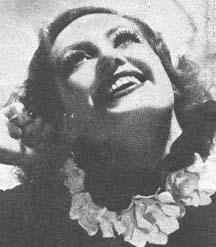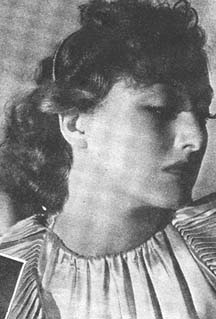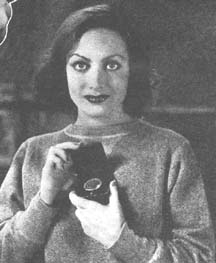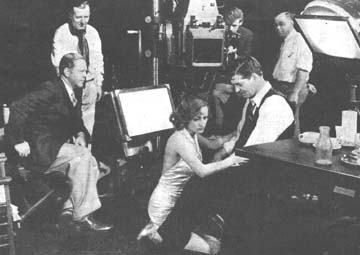Silver Screen: January 1934
Joan Crawford:
The Most Remarkable Girl in Hollywood
Joan Has
One Characteristic Which Beats in her Pulses and Dominates Her Every
Moment
by Helen Louise Walker
|
|
|
"You have to feel things," says Joan. "That is the only important thing in life, really." |
Joan Crawford was preparing for a scene the first time I ever saw her. In those days of silent pictures, there was always a small orchestra on the set for the purpose of creating atmosphere and inducing mood. Joan sat by the musicians, head in hands, eyes closed, concentrating on the emotions she must express. The organ moaned and the violin sighed. (It was, presumably, a lugubrious emotion for which she was preparing.) And so Joan sat, a tense little statue, thinking about it.
The director smiled, pointing to her. "She takes it so hard!" he said. "You would think that this scene were the most important thing in her whole life, in her entire career. It isn't a big scene in the picture."
Joan was only a little featured player then, recently graduated from "stock." It amused the more experienced people around her to see how hard she tried. Well, that is the way Joan has always taken things. Her life, her loves, her work. The big things and the little things. She has taken them, in actor's parlance, "big." People have laughed at her intensity, they have been impatient with it, they have complained about it. Well, I wish I had it! That intensity if Joan's chief asset.
I talked with her in her dressing room yesterday. "You have to feel things," she said. "That is the only important thing in life, really. If you try to avoid emotion, if you try to duck experience, as so many cocksure young people try to do today, you cheat yourself terribly. It took me a long time to learn that. I used to try to run from life, too. I used to try to avoid the things that hurt me or humilliated me. Now I know how important those things are to me.
"Why, just the business of letting yourself want something...letting yourself want it with all of you...is important. If you don't want things intensely, you won't get them. What's more, you don't deserve to get them!
"Certainly
you will be hurt. Certainly you will suffer. It doesn't matter. At least, you
will be alive; you won't be a vegetable. Learning that has given me a certain
sort of peace.
|
|
|
Joan has the actor's knack of dramatizing herself. |
"I am happier right now than I have ever been in my whole life. I suffered horribly over my marriage. But I wouldn't have missed it for the world. I have passed some sort of milestone. Maybe there are other hazards and more suffering ahead. But I feel -- well, safe -- right now!"
It occurred to me that this was the first time I had ever heard Joan admit she was happy. Oh, she was ecstatic, of course, in the early days of her marriage. But there were always things which had to do with her work, other worries. Joan has always seemed to me like a character out of one of Booth Tarkington's books. She has a chronic adolescence which Mr. Tarkington would recognize instantly, I am sure.
Years ago she used to tell me, "I am so unhappy! I stay alone in my apartment and turn on the Victrola and dance and dance and dance...until I am exhausted enough to find a little peace..." Later, when she was married to Doug, she used to drive alone on the desert at night, trying to run away from herself and her troubles.
She has the actor's knack of dramatizing herself and believing it. She thought of herself as a great actress and acted like a great actress in the days when everyone else thought of her as a pretty little girl who could dance. Well, that is how Joan has dominated her fate, has made her career. By believing in herself, in her capabilities, believing that she was what she wished to be.
|
|
|
Franchot Tone and Joan Crawford -- the much talked of lovers. |
Franchot Tone, Joan's' most devoted and most favored suitor just now, told me that after he had known her only a short time: "She has the most enormous capacity for interest in other people that I have ever seen. Joan has had problems of her own in the past few months. Not only did she suffer from an unhappy marriage, but she was tortured by untrue gossip and unfair reports in the public prints. You would think that she had enough on her mind with her own problems...But, no! She has to fret about the problems of a dozen or so other people. She is," he added, very solemnly, "a great woman. And that is not an adjective that I use often or carelessly. I think that about Joan."
I don't agree with Franchot. I do not consider Joan a "great" woman. But I think she nudges it. She has the emotional capacity, the sensitiveness which go with greatness. If her sensitiveness were a little more analytical, a little more mature, if she had more perspective...oh, well, I don't know! Who can say, after all, what constitutes greatness? She has one of the most vivid and vital personalities of our time.
Joan has a mother complex. There is no doubt about that. She loves to advise people, guide them, take care of them. Most of the men in Joan's life have been men who needed mothering -- and whom she could dominate. Joan has never been attracted to a dominant man.
A prominent writer told me not long ago that he was going to a doctor for a thorough examination. He hadn't been feeling quite fit for some time. "I shouldn't have bothered about it, myself," he said, almost apologetically.
"But Joan
insists that I go. Joan," he added, looking pleased all to pieces, "worries
about me. I can't imagine why!"
|
|
|
She has the emotional capacity which goes with greatness. |
Joan worries about everyone whom she likes. (I didn't mention that fact to the pleased young man.) The worry and the interest are genuine. She really cares whether people are well and happy. Prop boys, script girls, office boys on the lot, all come in for personal interest and attention. I have seen her in a state of almost tearful rebellion because a young writer in who she was interested was not, in her opinion, receiving the opportunities or enjoying the success which she felt he deserved.
She has an amazing effect upon people -- an almost hypnotic power over them. When I visited her yesterday there was, upon the set, a girl who had followed her out here from New York, where she saw her months ago. She has sent Joan letters and presents. She has telephoned her home and practically forced her way through Joan's door. She has got onto the set by some hook or crook but, from the dour expressions of assistant directors, she was not going to be allowed to stay there very long.
"But what is it you want of me?" Joan asked her, in real bewilderment.
"I just wanted to look at you!" the girl told her. She had crossed a Continent for that purpose, and she was obviously a girl who had not very much money.
Yet, Joan cares more than anyone I have ever known about what people think of her. She reads every word that is written about her and usually cries bitterly over it. When she was married to Doug, and the gossip about them was making them both so unhappy and so uneasy and so suspicious of one another, I said to her, "Why don't you take a vacation? Why don't you, for one month, read nothing that is printed about you anywhere? Why don't you try to get a perspective on your own life and your own situation without looking at yourself constantly through other people's eyes?"
"I'll do it," she declared. "You are perfectly right when you say that that is one of the main things wich is bothering Doug and me. We keep on reading this stuff...I shan't open a magzine or a newspaper for a month...and maybe I can persuade Doug not to open one, either."
|
|
|
The readers of Silver Screen voted Joan Crawford the Most Popular Player in Hollywood. So Silver Screen sent Joan a Gold Medal. It shows her beautiful profile. |
As we left the studio to go our separate ways, Joan stopped at a newsstand and bought seven magazines. My last glimpse of her showed her flipping the pages, eagerly, looking for items which mentioned her.
She never goes to parties if she can help it. She suffers from actual stage fright.
"That awful moment when you enter a room full of people! Everyone looks at you. I always think that they are talking about me, that they don't like me, that perhaps they are making fun of me! I spend hours before I go to a party, nerving myself for that ordeal of entering the room. I suffer horribly afterwards. I am sure then, that they didn't like me. They didn't like my frock. They thought that what I said was stupid...It's awful!"
That is ego, of course. She wants approval and admiration and friendship so desperately. She demands so much of herself. That is one of the things which has helped her to dominate her life and her career and the people around her. She has demanded so much of herself...
She is absolutely at the mercy of her moods. She used to go home from the studio, while she was still married to Doug, and say, "Please don't talk to me. I want to be still for a while." Doug would be agitated. "Has something gone wrong? Have I done anything? Did something go wrong on the set?"
"Please, Doug...I just want to be quiet!"
He would subside at last and sit watching her, anxiously, convinced that something was very, very wrong with her. At last she would cry, "Say something! Do, for goodness' sake, say something!" And his masculine bewilderment would equal that of any other young husband encountering a feminine and inexplicable mood!
That, you see, is part of Joan's code -- letting her feelings sway her, letting herself, as she puts it, "feel." I should hate to try to live with Joan, try to cope with her moods and her intensity. Yet, that very vitality, that electric something, that abandonment of herself to emotion, is what makes her so interesting, so personally powerful.
She hates the mechanical details of living. Planning clothes, planning meals, attending to her house.
"What would you like for dinner?" her cook asks her each morning.
Joan, coming out of some mental fog of her own, says, "What? Oh, dinner! Yes...oh, lamb, I suppose."
"But you had lamb last night..."
"Oh, did I? Well, I don't care. Anything you like...only don't make me think about it!"
Yet, on occasion, she will plan and personally supervise the serving of a meal that is a poem. "If you are going to give your attention to food at all, see to it that it is exquisite," she says. "Mostly, food doesn't matter. Once in a while it is extremely important."
|
|
|
When they made "Dancing Lady," Robert Z. Leonard, the director, at left and Joan Crawford kneeling before Clark Gable. |
Clothes which are not to be worn on the set bore her. Yet I have seen Joan stand for three days, patiently, cheerfully, being fitted for costumes for a picture. Those were important! She hates putting make-up on her face. She detests having her hair dressed. Yet, she never neglects one detail of that make-up and she has a hairdresser every evening and most mornings. That is important! So far as her personal life, outside the studio, is concerned, she doesn't mind if she has freckles, she never puts make-up on her face, and she doesn't much care what she has to wear.
When I first knew Joan, I could scarcely have called her pretty. Now I consider her one of the most beautiful women I have ever seen. Something throbs in her. Something magnetic and alive, something vivid and important, It has grown through the years. Joan is very, very lovely.
If she doesn't burn herself up with emotion, if she doesn't wreck her own nervous system with too much feeling, if she does not destroy herself by her own intensity, I think that Joan may still develop into one of the most interesting actresses of our day. She must mature a little more, ripen, develop a sense of proportion.
But, whatever she may -- or may not -- achieve as an artist, Joan is one of the most glamorous and interesting women of this time. And that, you know, is something!
By sheer intensity of feeling, or desire, or effort, Joan has at least neared her goal.
"You have to dominate your own life, your own self," she says. "Or your life and your self will dominate you!"





